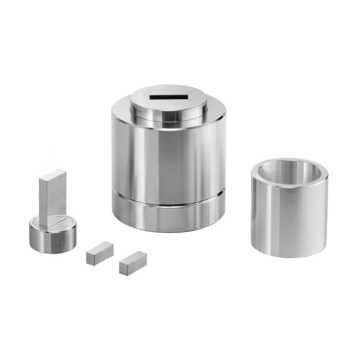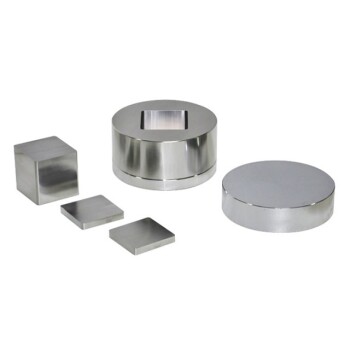At its core, a hydraulic press in a materials science laboratory serves two primary functions: to prepare materials into a standardized form for analysis, and to subject materials to intense, controlled pressure to characterize their fundamental properties. It transforms raw substances into a state where they can be accurately measured and understood.
A laboratory hydraulic press is not simply a tool for brute force. It is a precision instrument that creates the controlled conditions necessary to reveal a material's chemical composition, structural integrity, and behavior under stress.

The First Role: Creating Testable Samples
The most common use of a hydraulic press in a lab is to prepare samples. Raw powders or irregular fragments are often unsuitable for direct analysis with sensitive equipment. The press solves this by creating uniform, dense samples.
Preparing Samples for Spectroscopic Analysis
Many analytical techniques, like X-Ray Fluorescence (XRF) and Fourier-Transform Infrared (FTIR) spectroscopy, work best with flat, homogenous samples.
A hydraulic press is used to compact a powder mixture into a solid disc, known as a pellet. This process ensures a consistent density and smooth surface, which is critical for obtaining accurate and repeatable measurements of a material's chemical composition.
Creating Samples for Microstructural Examination
Beyond chemical analysis, researchers often need to study a material's physical structure. The press can be used to form thin films or compacts that are then prepared for analysis under a microscope. This helps reveal information about grain size, porosity, and phase distribution.
The Second Role: Characterizing Material Behavior
The second major function is to actively test how a material responds to force. This moves beyond sample preparation and into direct characterization of mechanical and physical properties.
Simulating Extreme Environments
Researchers use hydraulic presses to simulate the extreme pressures found in real-world applications or natural settings. This can include replicating the immense pressure of the deep sea or the intense forces within the Earth's crust. By observing how a material behaves, scientists can predict its stability and performance in demanding environments.
Determining Mechanical Properties
A key task in materials science is understanding a material's strength and deformation. A hydraulic press applies a controlled, measurable force to a sample.
By recording the force applied and the resulting deformation, researchers can generate a stress-strain curve. This fundamental plot reveals critical properties like a material's elastic limit, yield strength, and ultimate tensile strength.
Understanding the Pitfalls and Best Practices
While powerful, a hydraulic press is a precision tool where technique matters. Improper use can lead to useless samples and incorrect data.
The Risk of Inconsistent Pellets
The goal of pressing a pellet is homogeneity. If pressure is applied unevenly or too quickly, the sample can develop density gradients or internal cracks. This non-uniformity will skew the results of any subsequent analysis, particularly in spectroscopy.
The Importance of a Clean Die Set
The die set—the mold used to form the pellet—must be meticulously clean. Any residue or contamination from previous samples can be pressed into the new sample, leading to inaccurate compositional analysis.
Pressure Control is Critical
Applying too much pressure can fracture the sample or even damage the die set. Applying too little pressure results in a fragile pellet that lacks the density and integrity needed for reliable analysis. Successful sample preparation depends on finding the optimal pressure for each specific material.
Making the Right Choice for Your Goal
The way you use a hydraulic press should be dictated entirely by your research objective.
- If your primary focus is chemical analysis (XRF/FTIR): Your goal is to create a perfectly homogenous, smooth, and dense pellet to ensure measurement accuracy.
- If your primary focus is mechanical testing: Your goal is to apply force in a precisely controlled and measurable way to accurately capture the material's response to stress.
- If your primary focus is simulating high-pressure conditions: Your goal is to achieve and sustain a specific, high pressure to observe phase changes or material degradation.
Ultimately, the hydraulic press serves as a gateway, converting an inert substance into an active subject of scientific inquiry.
Summary Table:
| Application | Key Function | Benefits |
|---|---|---|
| Sample Preparation | Compacts powders into pellets for analysis | Ensures uniform density and smooth surfaces for accurate XRF/FTIR results |
| Material Characterization | Applies controlled pressure to test properties | Generates stress-strain curves to determine strength and deformation |
| Simulating Environments | Replicates extreme pressures | Predicts material stability in real-world conditions |
Enhance your laboratory's capabilities with KINTEK's precision hydraulic presses! Whether you're preparing samples for spectroscopic analysis or testing mechanical properties, our automatic lab presses, isostatic presses, and heated lab presses deliver reliable performance for accurate results. Contact us today to discuss how our solutions can meet your specific needs and drive your research forward!
Visual Guide

Related Products
- Automatic Laboratory Hydraulic Press Lab Pellet Press Machine
- Laboratory Hydraulic Press 2T Lab Pellet Press for KBR FTIR
- Manual Laboratory Hydraulic Press Lab Pellet Press
- Manual Heated Hydraulic Lab Press with Integrated Hot Plates Hydraulic Press Machine
- Laboratory Hydraulic Press Lab Pellet Press Button Battery Press
People Also Ask
- What are the advantages of using a hydraulic press for pellet production? Achieve Consistent, High-Quality Samples
- What are the limitations of hand-operated presses? Avoid Sample Compromise in Your Lab
- How do hydraulic pellet presses contribute to material testing and research? Unlock Precision in Sample Prep and Simulation
- What is the purpose of creating pellets for XRF spectroscopy using a hydraulic press? Ensure Accurate and Repeatable Elemental Analysis
- How are hydraulic pellet presses used in educational and industrial settings? Boost Efficiency in Labs and Workshops



















